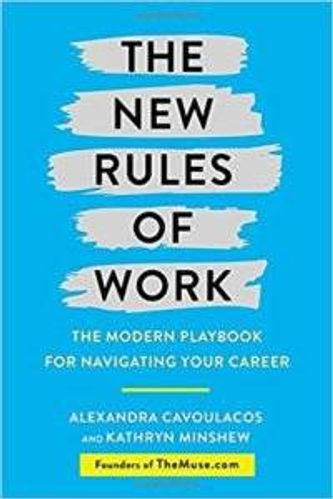Top Tips to Switch Careers From the Founders of The Muse
Smart advice from their book, 'The New Rules of Work'
A successful career switch doesn’t happen overnight. It’s a process of self-reflection, trying things out, adding skills and more — and it can take a few years to get things rolling. That’s why The New Rules of Work: The Modern Playbook for Navigating Your Career by Alexandra Cavoulacos and Kathryn Minshew, cofounders of the popular career site The Muse, appealed to me. And I believe it will appeal to many of you pondering a career shift as well.
“The advice in this book is going to be focused on that two-to-five-year horizon; on getting you ready to make the most of what you are doing today and for the next few years,” Cavoulacos and Minshew write. “The best part is you can return to it again and again — the practices and thought exercises we’re doing here will serve you not only now, but the next time you’re ready for another step, shift, or reinvention in your career.”
Bingo.
Preparing for Your Next Act
While The Muse tends to skew Millennial (its founders are in their early 30s), this straightforward guidebook isn’t confined to the newly-minted graduate. It covers the workplace waterfront from resumés to networking to job interviews that can help people of all ages and in all stages of their careers.

If you’re in your 50s or 60s and job searching for the first time in decades or pondering shifting fields to pursue a passion, The New Rules of Work captures the essence of what you need to prepare for your next act. (Curiously, though, there’s no chapter on starting a business, which is odd given the success of Cavoulacos and Minshew with The Muse, which they launched five years ago.)
One of the underlying takeaways from the book, which I preach with regularity, is that to follow a career path you love, you need a good grasp of your career values — from flexibility to compensation to creativity. What do you really want to get out of work? That must be your guide to navigating your career.
The authors write that your career is “your journey, and you’re in the driver’s seat.” That’s particularly true for older job seekers and prospective career switchers.
The Me Inc. Mentality
You must have a Me Inc., mentality — particularly if you’re not hardwired to radically change your line of work or start a business. Embracing the idea that you’re in control and are your own boss goes a long way to feeling engaged in your work.
The book has some terrific advice for career switchers such as joining LinkedIn groups, following industry influencers and subscribing to key newsletters. All of these can help you prepare for a career change, the authors say.

There’s also a solid chapter on the importance of trying out your next step in a small way rather than leaping in with both feet — one of my favorite tips for mid- and late career switchers. The importance of test-driving can’t be understated, in my opinion.
“The truth is, even if you think you would be happy in a particular career path, sometimes you don’t know until you try it,” Cavoulacos and Minshew write. “This has an added benefit of giving you real-life experience that you can put on your resumé and talk about when you’re applying to jobs.”
Test-drive options they suggest: Shadow someone who has the job, intern, volunteer at a nonprofit in the field you’re considering or freelance.
Far and away, my favorite chapter is the one on the importance of taking charge of your professional development. For workers over 50, this is non-negotiable. This was one of the themes discussed at the Columbia University 2017 Age Boom Academy program for journalists, which I recently attended. Ursula Staudinger, founding director of the Robert N. Butler Columbia Aging Center, and a Columbia professor of sociomedical sciences and psychology, discussed the positive impact learning new skills has on our brains as we age, in a session on the characteristics of work that contribute to cognitive health. Meantime, retooling can keep you enthusiastic and productive in your job, said Axel Börsch-Supan of the Munich Center for the Economics of Aging,
If you’re anticipating a career switch or pondering what you might do in your “post-retirement” job, start identifying the skills you’ll need as soon as possible. I encourage workers to start thinking at age 50 about what they might want to do at 55 or 60.
6 Tips for Career Switchers
Six more smart tips from The New Rules of Work:
1. Look through job listings, even if you’re aren't actively job hunting, and read the job descriptions of roles you might like in the future. Make notes of the skills that crop up the most often in those descriptions and then take steps to get them.
2. Peruse your contacts’ LinkedIn profiles. When you do, look at the skills of people with jobs that interest you, to help you see which ones you may need to learn or buff up. At networking events, talk to people with interesting jobs and ask what they had to learn to get where they are.

3. Figure out your learning strategy for a career switch. You don't necessarily need to go back to college for an advanced degree. Rather, take advantage of schools that offer one-off classes in practical, professional and technical skills. Most of these classes are offered at night, so you won’t need to quit your day job to enroll.
4. Look at free or low-cost classes online. They’re talking about programs offered through sites like Coursera and Edx as well as platforms such as Udacity. Udemy, Skillshare, Open 2Study and Lynda. Also, they note, many top universities now offer courses online to the general public. Two examples: MIT OpenCourseWare and StanfordOpenCourse Ware.
5. Go to conferences. If there’s a field you’re curious about, attend its significant confabs. Meet the people there, listen to the experts’ presentations and soak up everything you can.
6. Tap resources at your company that would be beneficial for switching careers. Check with your HR department to see whichtkinds of training and skill building are offered. Then sign up for programs that could be what you need for You 2.0.
Next Avenue Editors Also Recommend:


